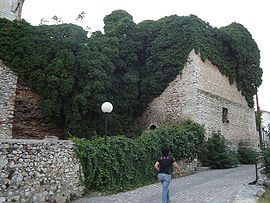Drama, Greece
|
Drama Δράμα |
|
|---|---|

Part of the town's Byzantine walls.
|
|
| Coordinates: 41°9′N 24°8′E / 41.150°N 24.133°ECoordinates: 41°9′N 24°8′E / 41.150°N 24.133°E | |
| Country | Greece |
| Administrative region | East Macedonia and Thrace |
| Regional unit | Drama |
| Government | |
| • Mayor | Christodoulos Mamsakos |
| Area | |
| • Municipality | 840.1 km2 (324.4 sq mi) |
| • Municipal unit | 488.8 km2 (188.7 sq mi) |
| Elevation | 115 m (377 ft) |
| Population (2011) | |
| • Municipality | 58.944 |
| • Municipality density | 0.070/km2 (0.18/sq mi) |
| • Municipal unit | 58.532 |
| • Municipal unit density | 0.12/km2 (0.31/sq mi) |
| Community | |
| • Population | 44.823 (2011) |
| Time zone | EET (UTC+2) |
| • Summer (DST) | EEST (UTC+3) |
| Postal code | 661 00 |
| Area code(s) | 25210 |
| Vehicle registration | ΡΜ |
Drama (Greek: Δράμα [ˈðrama]) is a city and municipality in northeastern Greece. Drama is the capital of the regional unit of Drama which is part of the East Macedonia and Thrace region. The town (pop. 44,823 in 2011) is the economic center of the municipality (pop. 58,944), which in turn comprises 60 percent of the regional unit's population. The next largest communities in the municipality are Choristi (pop. 2,725), Χiropótamos (2,554), Kallífytos (1,282), Kalós Agrós (1,178), and Koudoúnia (996).
Built at the foot of mount Falakro, in a verdant area with abundant water sources, Drama has been an integral part of the Hellenic world since the classical era; under the Byzantine Empire, Drama was a fortified city with a castle and rose to great prosperity under the Komnenoi as a commercial and military junction.
In the modern era, tobacco production and trade, the operation of the railway (1895) and improvement of the road network towards the port of Kavala, led to an increase in the population of the city and to the enhancement of commercial activity.
Drama hosts the "Eleftheria", cultural events in commemoration of the city's liberation, at the end of June or beginning of July, and an annual film festival in September.
Archaeological finds show that in the area of the modern city there used to be an ancient Greek settlement named Dyrama (Greek: Δύραμα) or alternatively Hydrama (Greek: Ύδραμα), both meaning "rich in water". Some scholars associate Drama with the ancient Greek Drabescus (Greek: Δράβησκος). Hydrama was notable as the place of worship for many Gods of classical Greek mythology, especially Apollo and Artemis. With the passage of time Dyrama became Drama. In the South Slavic languages, the city is known as Драма which is itself a transliteration of the Greek name.
...
Wikipedia


